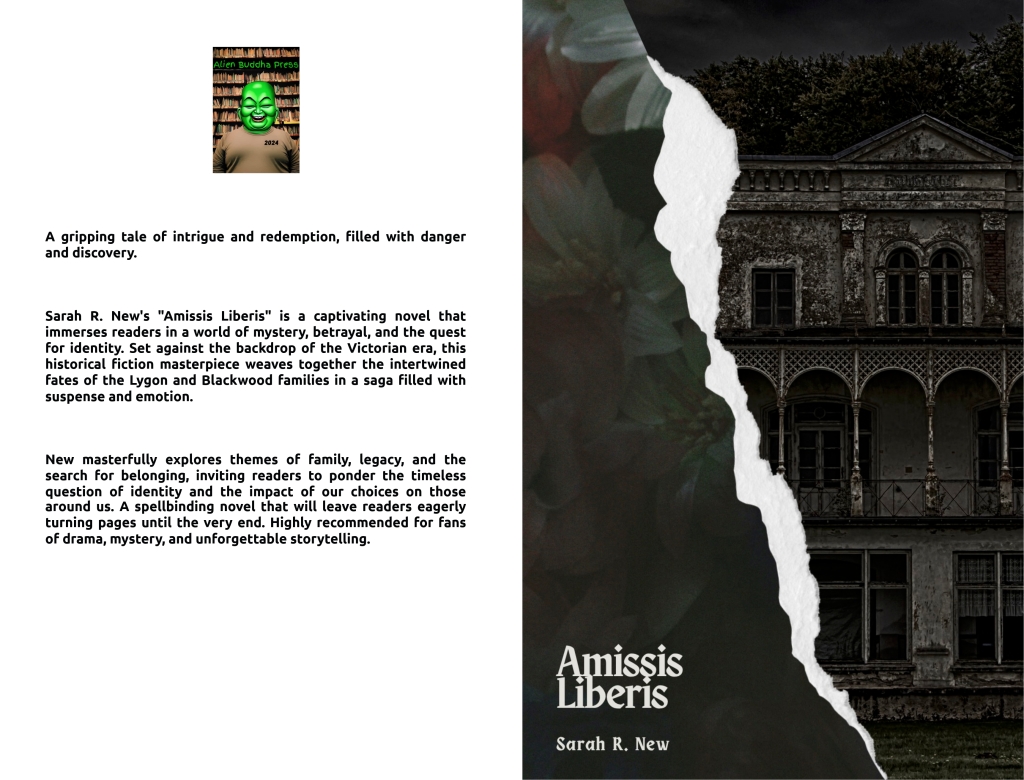
(chapter 1)
Looking back at everything, it’s amazing to note how sad the tale of the Blackwoods and the Lygons really is. When people talk about the story of the two families- and yes, they do still talk about them, even today- they speak of the scandals between the two houses, the outrage, the thrills. It is as if they have forgotten that these people, children in some cases, were real and not fictious, not simply conjured for their amusement. It is almost as if they never had a chance, as if they were always doomed for this to happen, not necessarily from their own actions. In writing this memoir, I hope to reclaim the identities of these so thought boogeymen, and lay claim to them for once and for all.
Why do I do this, do you ask? These people are not just boogeymen to me. These people are my family. I am Oliver Foster, the last living heir to the Blackwood and Lygon families in the British Isles, and I am here to reclaim my family and reputation.
I suppose our story starts with the three matriarchs who loom over our tale. The planets of our story, Lilian Lygon and Beatrice Blackwood, both vying for the unspoilt attention of our beloved, late monarch. Queen Victoria. Of course, our Queen would outlive both Beatrice and Lilian, passing away just a couple of years afterwards, but she had no way of knowing that.
Beatrice and Lillian were easily the strongest women in their families. It could even be said that they were really the heads of the families. Their tenacity and determination allowed them both to stand out at court, earning them both the eye and attention of our beloved queen. However, both women were ambitious, and neither would rest until they had bested the other.
But first, an introduction to the families. Beatrice Wainscott had been born the daughter of a minor earl, and had resigned herself to a life of a small, quiet household, completely different to what she had always envisioned for herself. But alas, her mother fell ill and died shortly thereafter, and her father – too overcome with grief to look at her – sent his only child to live with his sister in the city. Beatrice took quickly to the fast pace of the city, and within a month had met Cyril Blackwood, the man who would shortly become her husband. Cyril, having inherited his ancestral home of Ravensburn at the age of 15 after his father passed unexpectedly, was 3 years older than Beatrice, and had already established himself as a strong hand to the Crown. Beatrice and Cyril met at one of the season’s balls, and they were engaged by the end of the season. When asked, Beatrice would say that they fell in love at first sight, and couldn’t wait to be married.
They were married by the year’s end, and the gossip about court was that they had to marry quickly as she was with child. There were rumours, of course, that she had trapped him into marriage, but it was clear when the couple were in public how in love they were. But there were troubles coming. That summer came and went, and no child was delivered. And then the next summer came, and there was no child. In fact, none of Beatrice and Cyril ‘s children would be born live until five years after their marriage. Some said that it was due to the curse of Ravensburn. The large, imposing building had allegedly tripped Cyril’s father down a long flight of stairs, and whispers abounded that the building wanted to be left to rot in peace. However, this appeared to be proven untrue in 1860 with the birth of their premature daughter, Victoria.
Named after the queen – or the Queen’s eldest daughter, it depended on who you asked -Victoria was the sole light of their lives until her brother Hugo was born quickly after in 1862. But the birth was difficult, and Beatrice was never the same after, and so the decision to was made for there to be no more children.
Time passed. Cyril’s land and properties became more and more profitable. He was able to make more business deals to secure a fortune for his children, and became closer to the Queen and her sons. Beatrice became more and more content, and their children grew. The naming of her daughter drew the Queen to Beatrice, and she found herself elevated in society quickly. And with that elevation she found an adversary in Lilian Lygon.
Beatrice Blackwood may not have had a concrete plan to secure herself and her family in the Queen’s protection, but if she did, her plan worked. Upon coming of age, her daughter married a young favourite of the Queen’s, and Hugo married young Augusta Fairfax, rumoured to be the illegitimate daughter of one of the Queen’s sons. Whilst Cyril and Beatrice had a love match, that didn’t matter now. Their proximity and closeness to the Royal Family allowed for establishing of the Blackwood name in society, and increased power, which the marriages of Victoria to Percival and of Hugo to Augusta had secured. It didn’t necessarily matter to the couple if their children’s marriages were happy, per se, but if they were advantageous.
Fortuitously, despite it not being a happy marriage, Victoria had produced two sons, Philip and Ernest, two dour, sullen boys who seemed, like their mother, to pity their spineless father. Augusta had only given birth to a daughter, Cordelia, who was the apple of the entire Blackwood family’s eye. Even at the age of 6, she seemed friendly and charming, much more than could be said about her elder cousins. Her parents’ relationship had been rocky, but since Cordelia’s birth, Augusta and Hugo had gotten closer and closer, even declaring love for each other after a while. Cyril and Beatrice had high hopes for more grandchildren. Especially after Ada.
Cyril and Beatrice’s last child had been born three years before her elder sister’s marriage. The birth, advised against by doctors, had been hard on both Ada and Beatrice, and had nearly killed both of them. When she had to recall Ada’s birth, the only thing Beatrice could recollect was Cyril attempting to breathe life into their lifeless newborn as she lay there, weak, bleeding and screaming.
But Ada had survived, and had been brought up as an unexpected but dearly loved daughter. Her elder sister would spitefully sneer that Ada was spoiled, and Hugo would chuckle as he told her she needed to leave her childish ways behind as she was now turning 17. Ada was known to be an impossible beauty, inheriting her mother’s brunette ringlets and her father’s golden hazel eyes. Cyril had had many offers of marriage for Ada, but he and Beatrice had struggled to accept any of them. Ada was the light of their lives, their last child, and unlike Victoria and Hugo they struggled to let her go. Unfortunately for them, Ada was beautiful more beautiful than her practical sister, and more flighty and naïve than her level headed brother, and this would lead to her downfall.
Lilian Albion would have proudly told you that she had fought for everything she’d ever had. She grew up as the daughter of an unreliable, drunkard lord and swore better for herself, both in terms of status and treatment. And she found that in Bertram Lygon, a weak willed man who let Lilian walk all over him. The terms of their marriage are not certain even now; it was rumoured she’d tricked him into marriage. No matter what the true story was, in the summer of that year Lilian and Bertram were wed.
The marriage went exactly as Lilian had planned. Bertram had never been much inclined to fulfil his lordly duties, leaving this to his wife, who relished in them. She became the head of the household in all but name, cementing their reputation as a society climbing but hard working family. She even secured the Lygon dynasty by bearing three healthy sons in five years, Sebastian, Leopold and Aubrey.
Sebastian was the heir, and had been brought up as such; always taking on a leaderly yet dutiful role. He had always been a high strung child, unable to let himself simply play with his brothers, and he took this attitude with him into adulthood. He did his duty and married an eligible young heiress, Eliza Grantport, who quickly became with child. But alas! The children Eliza bore were all daughters; Lydia, and twins Mabel and Flora. Eliza was delighted with her three daughters, especially when she had struggled to conceive with the twins, but Sebastian was furious that none of their children were male, and Eliza could not conceive another. This also was a strain on Lilian, who desperately coveted a male grandchild, and who would routinely tell Sebastian of the disappointment this caused her. His inability to provide a male heir soured Sebastian’s relationships with his wife, daughters, and mother, and left him lonely.
Leopold, named for the Queen’s youngest son – and not at all as a way to show up Beatrice Blackwood – grew to be a dashing young man who was devoted to his mother. Lilian would often gloat about how handsome and dutiful her son was, especially when compared to Hugo Blackwood. But then Leopold betrayed his mother, causing a rift that would never fully heal. After an intense but brief courtship, Leopold left the city and came back a month later with a lovely new wife, Millicent Innes. Millicent, or Millie, as she preferred to be known, was temperamental and girly, everything Lilian hated in a woman. Leopold and Millie redeemed themselves somewhat with the birth of their son Henry the next year, and Lilian was overjoyed. Her ageing confused husband never recognised the child as being kin.
Lilian and Bertram’s last son, Aubrey, had always been a problem. It was said that upon his difficult birth Lilian looked at the child and was revolted, and in spewing these words from her mouth she placed an indelible curse on him, where thereafter wherever he went trouble followed. And Aubrey was trouble. Good looking: tall, blonde with a chiselled jaw and strong shoulders, Aubrey Lygon was handsome and influential and he knew it. The problems with Aubrey started before he came of age, where it was said he had caused a maid in the household to become with child. Whether or not this is true, I cannot say, only that the maid in question was removed quickly from the household and never spoke of again.
But the problems with Aubrey did not stop there. There were rumours of other women being made pregnant by Aubrey, but not just maids, young ladies as well. And then there was the violence. Lilian couldn’t control him. It started behind closed doors. Maids, valets, his own brothers, no one was safe from Aubrey. But it escalated, and just kept escalating. Often young gentlemen would be goaded into fights with Aubrey, and he would always win, gloating in his triumph. Lilian tried to sedate him, by securing an advantageous match with a young heiress named Araminta Raleigh, hoping he would calm his ways once married. But when his soon to be fiancée arrived with her parents at Lygon Manor, in tears and with Aubrey’s handprint purple on her arm, the courtship was broken, and Lilian realised the trouble she was in. Looking back now it is clear to me that this realisation was simply the beginning of the end.
And now with the story set, the main characters introduced, we arrive at our story. The year is 1897. Lord and Lady Blackwood are preoccupied with climbing higher and higher in society to notice Victoria’s marriage deteriorating, or how Ada’s naivety has not allowed her to grow up, and be aware of the dangers of the world around her. Lord Lygon’s health is failing rapidly, and with his mind near gone, his wife must take on the burden of the household. The relationships Sebastian holds with his mother, his daughters, and most importantly, his wife, are rapidly deteriorating, while Leopold and Millie worry they’re being ostracised from the family. Aubrey appears out of control, and all this time our easily unamused queen plays with our matriarchs as if they are her favourite dolls.
The year is 1897, and this is the story of how the noble houses of Lygon and Blackwood fell.

